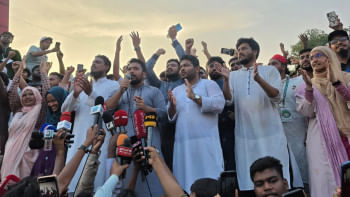Look for alternative means to disburse SME stimulus
Speakers at a virtual discussion yesterday suggested that channels alternative to banks be used to disburse government stimulus funds among cottage, micro, small and medium (CMSME) enterprises in a faster and even manner.
So far, a little over 30 per cent of the government CMSME stimulus fund has been disbursed in efforts to offset the Covid-19's fallouts while almost all stimulus packages for other sectors have already been distributed through the banking channels.
The CMSME fund disbursement is going slow because banks are not interested in taking the risk of lending money to this sector's unbanked entrepreneurs, said speakers.
Many such entrepreneurs manage funds from alternative banking channels and so were reluctant to take the direct route, they said.
Shykh Seraj, founder director and head of news at Channel i and vice-president of Dhaka University Alumni Association (DUAA), said the government stimulus has not reached rural entrepreneurs who suffered the most.
He urged exploring alternative channels for the distribution.
Md Sirazul Islam, executive chairman of Bangladesh Investment Development Authority, requested developing a database of these rural and urban entrepreneurs and also ignite inner potential of students.
He hoped that a planned effort once the Padma bridge is constructed would significantly improve the business environment.
The views came at a "Closing Ceremony of the Eight Divisional Webinars and CMSMEs in Bangladesh: Journey, Challenges and Future Direction-Khulna Division" organised by the Innovation, Creativity and Entrepreneurship (ICE) Center of the University of Dhaka.
It was a part of its REVIVE Project, a joint collaboration of ICE Center and UNDP Bangladesh.
The webinar was the final one among eight organised to discuss stories, challenges and future direction of the CMSMEs in different regions of Bangladesh.
Attending as keynote speaker, Momtazuddin Ahmed, an honorary professor, laid emphasis on the importance of focusing on a "bottom-up" policy for the CMSMEs and urged to consider having an "SME Bank", "SME Act" and their proper running implementation.
While highlighting the ground-breaking achievement of the Padma bridge's construction, Palash Kanti Bala, chief executive officer of Khulna City Corporation, highlighted that it would connect and create a sustainable business and economic environment in the region.
Mashiur Rahman, economic affairs adviser to the prime minister, said the centralisation approach was a constraint for developing the CMSMEs in Bangladesh.
He put emphasis on regional connectivity towards inclusive, efficient and balanced development of the country.
Md Rashedur Rahman, executive director of ICE Center; Md Khurshid Alam, assistant country representative of UNDP in Bangladesh, and Kazi Aminul Haque, president of the Khulna Chamber of Commerce and Industry, also spoke.

 For all latest news, follow The Daily Star's Google News channel.
For all latest news, follow The Daily Star's Google News channel. 



Comments